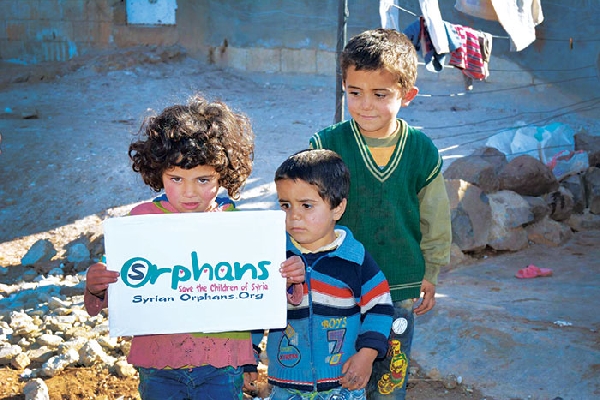
|
| Syrian orphans seeking aid and adoption from foreign families – Photos by SyrianOrphans.org |
DEARBORN — As millions of Syrian families suffering the impact of war seek refuge in the West, numerous Arab American families are stepping up to adopt children whose families are nowhere to be found.
Maria Kabbani, an international trade law specialist, is an Italian American Dearborn resident who has dedicated her life to pursuing the best approaches to housing orphaned Syrian children in the United States.
The first in her family to go to college, Kabbani, 33, said she witnessed the struggles of disadvantaged children and realized the importance of education.
Converting to Islam at age 16, she has dedicated her life to service.
“There’s no purpose in life if you can’t save others; this is our job,” Kabbani said.
She said she recently bought a house in Dearborn for the purpose of giving shelter to three orphaned Syrian refugee children.
“Superficial propaganda”
Despite her best efforts to resettle the refugee children, none of them have been placed in American homes so far. The processing and vigorous vetting procedures that refugees are required to undergo to enter the United States have limited the ability of adoption agencies to give shelter to the children.
Faced with the hurdles of relocating refugees into the country as enforced by federal immigration laws, Kabbani has taken matters into her own hands.
Through her organization, Orphans of War, Kabbani aims to assist families with adoptions and guide them through the complex process of adopting international refugees and war orphans.
She constantly contacts federal and local officials, seeking answers to how and when she would be able to take in the Syrian kids.
“Whenever I get a response, It’s always deflected,” Kabbani said about her inquiries. “It always goes back to the same rhetoric of ‘we have a process; we’re spending money and the United Nations are the ones that have to try to promote this issue.'”
In a letter to Kabbani, Sen. Debbie Stabenow (D-MI), explained that the rigorous vetting process refugees face takes more than two years to complete. The senator wrote that she is a “consistent supporter of funding for the State Department’s Office of Refugee Resettlement” and that she recently introduced the Domestic Refugee Resettlement Reform and Modernization Act (S.1615) that would help refugees get the resources they need to readjust.
In another letter, Rep. Debbie Dingell (D- Dearborn), stated that a new layer for the screening of Syrian refugees was added for 2014 applicants, citing national security risks.
“There are more urgent issues we must work on together, such as changing the Visa Waiver Program responsibly, investing in anti-terrorism efforts and using our resources effectively to destroy Daesh,” Dingell wrote.
Kabbani described the “angering” responses she receives from lawmakers as “superficial propaganda” and added that federal officials hold a double standard.
“If you leave them in these countries, they’re very susceptible to being kidnapped, to being taken into these organizations that you’re trying to protect yourself from,” she said.
Interested parents, few adopters
Even without answers, Kabbani still has hope and continues with efforts to soon be able to give children without homes or families proper shelter and education.
With the help of Samaritas and Syrian Orphans Org., groups dedicated to helping orphaned children and the widowed in seeking refuge from war-torn countries, she facilitates hosting events to bring awareness of the issue in local communities.
“We are trying to raise some awareness in the community that we need more Muslims to open their homes and become licensed [to adopt kids],” she said.
Aside from immigration obstacles, Kabbani said a considerable challenge is finding dedicated local families willing to adopt children. She added that Muslim families hesitate to adopt children because of the implied background and financial record checks. Immigrant families have long shied away from government and authorities prying into their personal affairs.
“We’re trying to make sure that they have those opportunities to keep their culture, their religion and the language as much as possible,” Kabbani said. “When they do come here, they’re very traumatized, so the easier the transition, the better.”
To help spread awareness to Muslim families, Samaritas, formerly Lutheran Social Services, hosts forums in partnerships with mosques, aimed at answering questions Muslims have about being foster parents and adopting children. Topics discussed include how hijab-wearing mothers can live with a non-relative teenage boy.
Diane Baird, program manager at Samaritas in Michigan, said the group is one of 22 foster care programs nationwide.
Baird said many Syrian orphans face the problem of extended waiting times to be placed in American homes.
On average, it may take up to two years for the United Nations to process refugees separated from their families, refer them to the United States for resettlement and work with the 22 orphan resettlement organizations to find them homes.
In some cases, it has taken up to 10 years, she added.
There are about 4 million Syrians who have been displaced from their homes, according to the U.N. Refugee Agency.
Baird said Samaritas has received more calls about Syrian refugee orphans in the past year than ever before, but few have applied to be licensed foster parents.
“We have no barriers to placing Syrian children at all,” she said. “There’s a shortage of foster families.”
However, she said many families are deterred from adopting refugee children because they prefer babies or young kids.
According to Baird, most of the refugee minors are boys, as many girls crossing borders fall victim to human trafficking; and 98 percent of them are teenagers.
At the moment, significant delays prevent the orphaned kids from traveling, but Baird’s sources estimate it will be around September of 2017 when Syrian children begin to be referred to American households.
For information and resources regarding the adoption of refugee orphans, visit Syrianorphans.org or Samaritas.org.






Leave a Reply